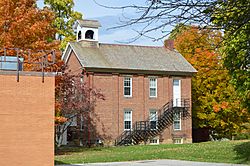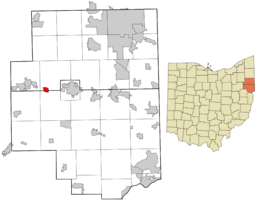Damascus, Ohio facts for kids
Quick facts for kids
Damascus, Ohio
|
|
|---|---|

Damascus Grade School (1902)
|
|

Location of Damascus in Mahoning and Columbiana counties and in the State of Ohio
|
|
| Country | United States |
| State | Ohio |
| Counties | Mahoning, Columbiana |
| Townships | Goshen, Butler |
| Area | |
| • Total | 0.81 sq mi (2.09 km2) |
| • Land | 0.80 sq mi (2.07 km2) |
| • Water | 0.01 sq mi (0.02 km2) |
| Elevation | 1,207 ft (368 m) |
| Population
(2020)
|
|
| • Total | 418 |
| • Density | 523.15/sq mi (202.04/km2) |
| Time zone | UTC-5 (Eastern (EST)) |
| • Summer (DST) | UTC-4 (EDT) |
| ZIP code |
44619
|
| Area code(s) | 330, 234 |
| FIPS code | 39-20030 |
| GNIS feature ID | 2628881 |
| School District | West Branch High School |
Damascus is a small community in the state of Ohio, United States. It's not a city or town with its own government. Instead, it's called an unincorporated community. It's also a census-designated place, which means the government counts the people living there for official records.
Damascus is located where two counties meet: Mahoning County and Columbiana County. In 2020, about 418 people lived there. You can find Damascus where three important roads cross: U.S. Route 62, State Route 173, and State Route 534.
This community is part of a larger area called the Youngstown–Warren metropolitan area. It also belongs to the Salem micropolitan area. Damascus has its own post office with the ZIP code 44619.
History of Damascus
Damascus was officially planned out in the year 1808. The community got its name from the very old city of Damascus, Syria, which is in Syria.
When Damascus was first being built, many of the early settlers were Quakers. The Quakers are a religious group known for their peaceful beliefs. The Damascus post office first opened its doors in 1828.
Population Changes in Damascus
The number of people living in Damascus has changed over the years. Here's a quick look at the population counts from recent official surveys:
| Historical population | |||
|---|---|---|---|
| Census | Pop. | %± | |
| 2010 | 443 | — | |
| 2020 | 418 | −5.6% | |
| U.S. Decennial Census | |||
See also
 In Spanish: Damascus (Ohio) para niños
In Spanish: Damascus (Ohio) para niños
 | Emma Amos |
 | Edward Mitchell Bannister |
 | Larry D. Alexander |
 | Ernie Barnes |

